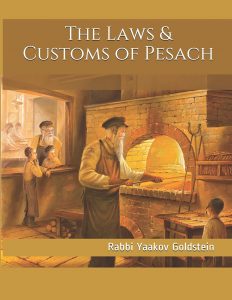
*The article below is an excerpt from the above Sefer
*As an Amazon Associate I earn from qualifying purchases.
The miracle of Shabbos Hagadol:[1]
The Shabbos before Pesach is called Shabbos Hagadol, as on that Shabbos a great miracle occurred. On that Shabbos, the 10th of Nissan, was the day that Bnei Yisrael took a lamb for the Pesach offering, as is stated explicitly in the verse. When the first born Egyptians saw this occurring on Shabbos, they gathered by Bnei Yisrael and asked for an explanation for their actions. They were then told by Bnei Yisrael that the lamb is going to be a sacrifice to G-d, which will kill the Egyptian first born. The first born Egyptians proceeded to go to their fathers and to Pharaoh to request from them to release the Jewish people. When they were answered negatively, the first born Egyptians resorted to making war with them[2] and they killed many of them. This is the meaning of the verse “And Egypt was stricken by their first born”. This miracle was then set to be remembered for all generations on Shabbos [before Pesach], and they called it “The Great Shabbos”. [See footnote for other reasons[3]] Shabbos Hagadol was thus the beginning of the redemption and the miracles.
How do we know that the 10th of Nissan originally fell on Shabbos?[4] The Jewish people left Egypt on the 15th of Nissan, which was on a Thursday, thus the 10th of Nissan was on the previous Shabbos.
Why is the miracle commemorated on the weekday of its occurrence, and not on its date of the month, as is the case with all other commemorated events?[5] Miriam had died on the 10th of Nissan, and this date was thus instituted as a fast day[6], in years that the 10th of Nissan occurs on a weekday. [Thus due to the preoccupation of this date with the passing of Miriam, the commemoration of the Shabbos Hagadol miracle was set for the weekday of its occurrence, which was the Shabbos before Pesach.]
[1] 430/1
[2] Seemingly this means with the Egyptian people, their fathers, and Pharaoh.
[3] To note the Tzemach Tzedek brings from the Shivleiy Haleket that another reason for the name “Shabbos Hagadol” is because the Drasha on this Shabbos takes a long time, and therefore the congregation ends up delaying the leave of Shabbos, and it thus seems like a longer Shabbos. Hence it is called the great Shabbos.
[4] 430/1
[5] 430/1
[6] Michaber 580/1-2


Leave A Comment?
You must be logged in to post a comment.